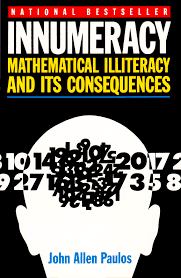Let’s play a game? It’s simple. We’ll flip a fair coin. If the coin comes up heads, I’ll give you two dollars. If the coin comes up tails, you only have to give me one dollar. Cool?
This is a great game. For you. For me, not so much. Because although I’ll win about half the time, in the long run I will lose two dollars for every dollar I win. You, on the other hand are going to win. The longer we play, the more you will win. If we flip the coin a hundred times, chances are you will be have fifty dollars more than you started with.
1) This game is an example of the “expected value theorem.” I just wrote, “EVT” in the headline for the newsletter this week because I didn’t want to scare anybody. Some of my best friends are not enamored of math—you know who you are Deara, Mackenzie—and I didn’t want you to delete this column without giving it a chance.
2) There are no games like this in real life. No casino or lottery has an expected value where the player is going to come out ahead. Somebody has to pay for all those ads on TV telling you that “you never know.” That somebody is you. If you play games at a casino, you will lose money. The expected value is “how stupid do you think they are, they know more math than you, you will lose in the long run.”
3) In the actual world where so many of us live, all the games favor the house. In the long run you will lose. Take it to the bank. Except you can’t go to the bank. Because you lost all your money playing games at the casino.
There is a game where you could win. Of course, it’s imaginary. The make-believe game is called, “The Crazy Millionaire Game.” I think I first read about the Crazy Millionaire Game in John Allen Paulos’s Innumeracy in 1988, but the idea has been around for a while. The crazy millionaire offers you TWO million dollars if the coin comes up heads. You only have to pay ONE million dollars if the coin comes up tails. In the long run, you will win. If you toss the coin a hundred times, chances are you will win fifty million dollars!
But you can’t play. Because if you lose the first flip, you have to pay one million dollars. And you can’t afford that. The expected value theorem works. But your aversion to risk—your realistic concern about the 50/50 chance that you will lose the first toss—prevents you from playing.
I read about some terrible news recently. A woman in California lost her 20-year-old son to suicide. The young man deliberately ran out into traffic, was hit by a truck, died instantly. It is hard for me to wrap my head around this loss. I didn’t know the family. But as the father of four my heart is broken for these folks. I don’t know anything about them. Other than the fact that the parents got a phone call asking them to identify the body—the body!—of the child whom they had held in their arms 20 years previously, the child for whom they had such hopes, the child who should have been a comfort to them in their declining years.
- Some politicians talk about selling marijuana that is safe rather than marijuana that is unsafe.
- Some organizations talk about making marijuana illegal. Many people argue that the fight to keep marijuana out of the hands of young people has been lost long ago.
- Medical marijuana is helpful for folks suffering from glaucoma and the effects of chemotherapy. This dead 20-year-old’s optic nerves were not damaged nor did he have cancer.
- The marijuana of 50 years ago was 2-4% THC; the marijuana available today is ten times as potent, can be laced with opioids, has been linked to mental illness. Some folks argue that kids who have issues to begin with—trauma, attachment—are more likely to be attracted to pot, that kids who have healthier connections to their parents are less likely to develop a dependency on pot.
- Many folks argue that the tax revenue from the sale of pot is here to stay.
- The governor of Colorado suggests that marijuana being legal hasn’t changed anything, that people who previously smoked marijuana continue to do so and that people who don’t smoke marijuana still don’t.
I don’t know. I’m not a policy guy. I have opinions about the above statements, but I won’t bore you with my limited insights into laws, taxes, and politics if you promise not to share your sentiments with me. All I understand is that the longest journey begins with a single step and that there was a point when this dead kid smoked pot for the first time. The politicians weren’t there when he did. Neither were the organizations. Neither were the folks benefiting from the tax revenue. The governor of Colorado wasn’t in the home of these folks who five years later would lose their son to suicide.
When her son smoked pot for the first time, mom’s thinking may have included thoughts something like the following:
- Chances are that kids are going to smoke pot; I’d rather my son smoke pot at home, not out with friends where something bad is more likely to happen.
- Chances are my son will just experiment with pot.
- Chances are he won’t become dependant.
- Chances are he’ll only smoke pot that is “safe,” that has a modest concentration of THC.
- Chances are he won’t kill himself five years from now by running into traffic.
Do you see where I’m going with this, where the expected value theorem comes in? All of the above scenarios are comparable to “winning a dollar.” Sure I suppose it would be marginally better if kids smoked marijuana at home as opposed to while driving a car. It certainly would be preferable for kids to smoke marijuana with a 2-4% THC level rather than a 20% THC level. And who wants all the unpleasantness of telling a kid that he is unequivocally not allowed to smoke pot, that parents will take him out of school, that parents will spend the college fund on treatment?
But a child’s suicide is the million-dollar coin flip with which parents cannot afford to gamble.
Because parents are the first and best defense against incalculable loss. A zero tolerance policy is the only protection again unsupportable tragedy.
You can bet on it.





